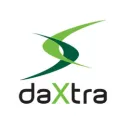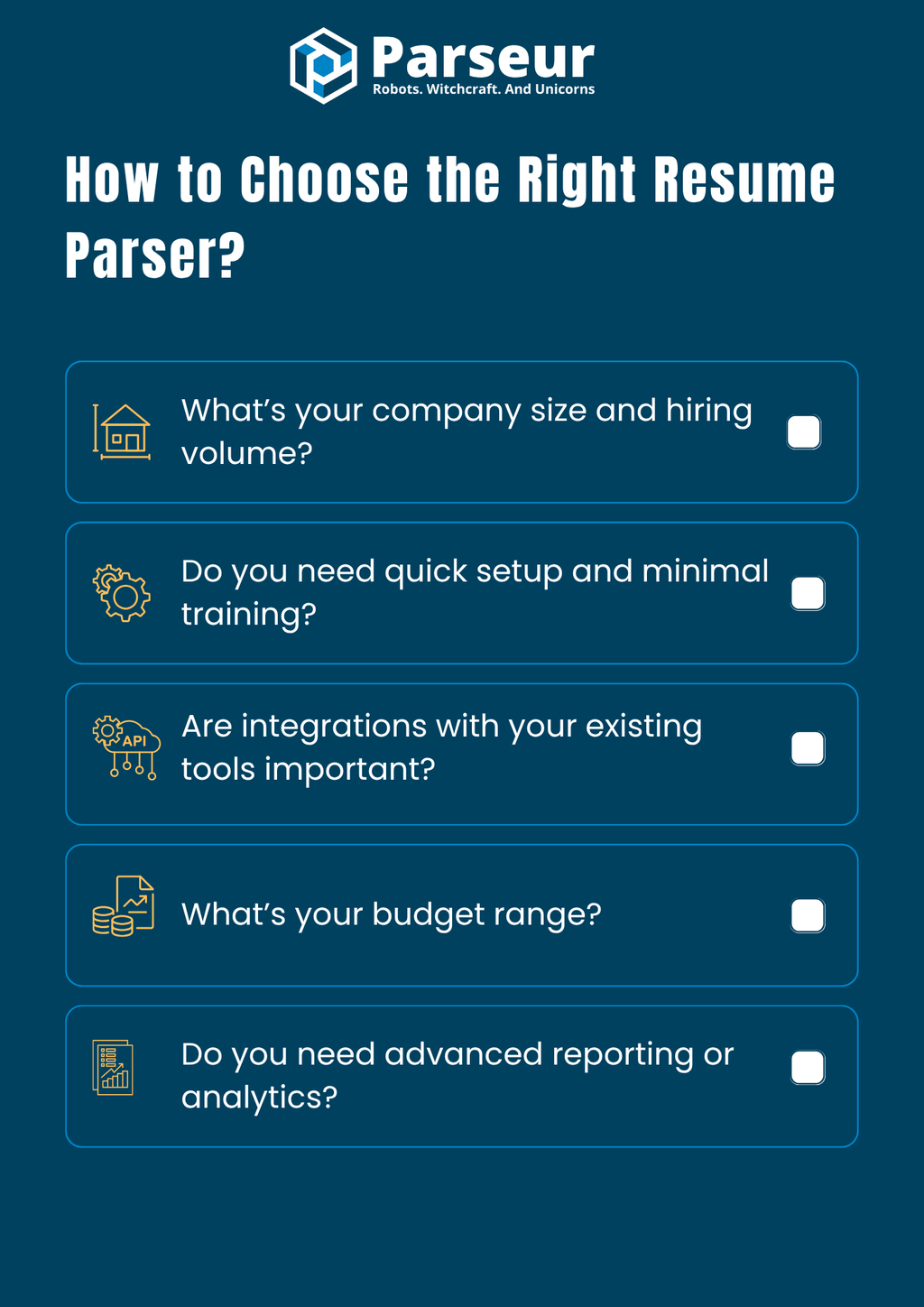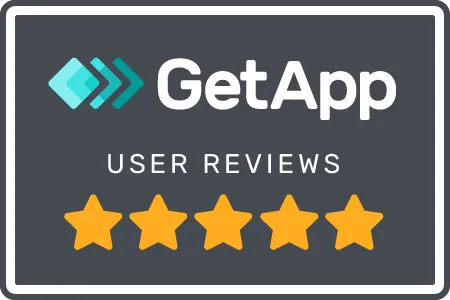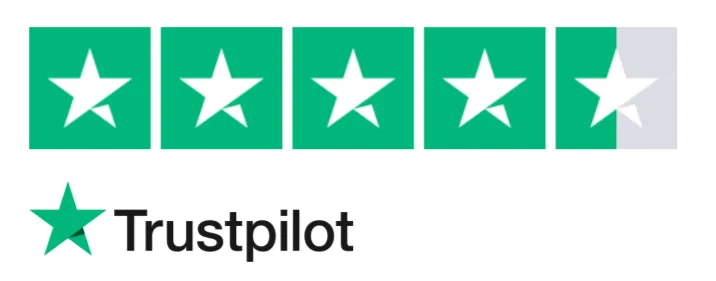Key Takeaways
- Parseur is a scalable, AI-powered resume parser designed for teams of all sizes, from startups to large enterprises. It offers quick setup, powerful integrations, and transparent pricing, with or without templates.
- Daxtra is built for enterprise-level hiring workflows, offering multilingual support, deep ATS/CRM integrations, and advanced analytics for high-volume recruiting.
- Parseur offers a free plan and transparent pricing, while Daxtra requires custom enterprise quotes.
Parseur Resume Parser vs. Daxtra
Choosing the best resume parsing software is crucial for improving hiring efficiency, reducing manual errors, and integrating seamlessly with your ATS or CRM. In this comparison, we look at two leading AI-powered parsing platforms, Parseur and Daxtra, to help you decide which is best for your organization.
As stated by Moka HR, automated resume parsing tools can reduce candidate screening time by up to 75% compared to manual review.
Parseur combines a sophisticated AI parsing engine with the option to create your templates if you prefer more control. It requires no technical knowledge and delivers powerful parsing flexibility.
Daxtra, launched in 2002, is a veteran in the space known for its exceptional parsing accuracy. It supports parsing over 150 data fields in 40+ languages and offers cloud-based and on‑premise integration via REST or SOAP APIs.
What Is a Resume Parser?
A resume parser is software powered by AI and natural language processing (NLP) that automatically pulls key information, such as name, contact details, work history, education, and skills, from a resume and converts it into structured data that integrates with HR tools or applicant tracking systems.
As Joel Sadhanand mentioned, AI-driven parsing tools have helped companies reduce screening time by up to 70%, according to a case study involving a Fortune 500 company processing 250,000 annual applications. Automating this process eliminates manual data entry and speeds up candidate sorting.
Why does resume parsing matter in HR?
- Saves time and effort: Processes hundreds of resumes in seconds rather than hours.
- Improves accuracy: Reduces errors and ensures consistent data capture.
- Enables smarter decision making: Let recruiters filter and compare candidates quickly on specific criteria.
AI-powered resume parsing
Modern parsers use advanced AI techniques similar to large language models. This allows them to understand different resume formats, such as PDFs, Word documents, and scanned images, accurately identifying and extracting relevant information.
Overview of Parseur Resume Parser
Parseur is an AI-powered resume parsing solution that automates extraction from PDFs, Word docs, email attachments, HTML snippets, and scanned files (OCR-enabled for 60+ languages), offers optional training to refine data capture, and delivers structured output directly into HR tools via API or integrations, backed by millions of documents processed monthly, 99.9 %+ uptime, and average customer saves about 189 hours and US $7,557 per month.
Who is it for?
- HR teams and recruiters across both SMBs and enterprises
- Organizations that handle high volumes of resumes
Key features
- Easy to use with no technical setup required
- AI engine supports hundreds of document layouts
- Optional “teaching” for custom field extraction
- Broad file format support, including PDFs, emails, Word, HTML, and scanned images.
- Seamless integrations with HR applications
- Scalable to millions of documents per month
- Transparent pricing with a free tier available
- Great for small to mid-sized businesses and growing teams
Why choose Parseur for automating HR processes?
Parseur delivers robust AI-driven parsing from the start, requiring no technical setup. Its engine works effectively out of the box, yet you can still “teach” it to refine data extraction. This dual approach combines the ease of automated AI parsing with the flexibility to fine-tune for specific use cases. It also supports every resume format you’ll likely encounter, PDFs, Word docs, scanned files, and emails.
Once parsed, data can be sent seamlessly to tools like Google Sheets, ATS systems, CRMs, or custom workflows via Zapier, APIs, Power Automate, or webhooks. Enterprises benefit from scalability and reliability, as Parseur can handle high volumes of resumes while maintaining uptime and data security. For smaller teams, the intuitive point-and-click setup removes any need for coding so teams can deploy quickly.
In short, Parseur balances simplicity and advanced functionality: AI-powered parsing plus optional template teaching, multi-format support, robust integrations, secure large-scale operations, and easy usability, all without requiring a developer.
For me, using Parseur means I spend less time on data entry between emails and spreadsheets. Integrating with Google Sheets is also a win for me. It's a much more user-friendly platform compared to other email parsers I've tried previously and seems much smarter also. The support is really quick and hands-on which is great.

“Handles all of our needs in an easy-to-use interface. We can parse any HTML email, then send it to a number of different sources to use the data. We use Zapier almost exclusively, and the built-in functionality with Parseur makes it effortless to integrate.”

Overview of Daxtra Resume Parser
Daxtra is an enterprise-grade resume parsing platform built for large staffing agencies and recruitment firms. It excels in processing massive volumes of resumes, over 100 million per month, while integrating deeply with applicant tracking systems and CRMs.
Who is it for?
- Large staffing firms and enterprise HR teams
- Organizations requiring high-volume, reliable parsing and analytics
Key features
- Parses resumes and job postings in over 40 languages with advanced geographical and number format recognition.
- Offers both cloud-based and on-premise deployment, with integration via REST or SOAP APIs
- Built-in analytics enable insightful reporting, candidate matching, and performance dashboards.
Cons
- Setup can be complex and may require technical resources
- Pricing is not publicly listed and typically requires a custom quote
- More than what smaller teams or SMBs need
- Less flexible for non-enterprise workflows or low-code integrations
Detailed Feature Comparison
To help you better understand how each tool works, we’ve outlined the key features of both Parseur and Daxtra side by side. This comparison covers setup, supported formats, integrations, and more, so you can find the best fit for your resume parsing needs.
 Daxtra |
 Parseur |
|
|---|---|---|
| Setup | API -based | AI-based Template-based PDF-summarizer |
| Parsing reliability | Good | Great |
| Supported format | PDF Word Job postings |
PDF Emails Attachments Spreadsheets HTML documents Text documents Word documents |
| Import | Upload in app Via API |
Upload in app Via email Via automation Via API |
| Table parsing | Yes | Yes |
| Automatic parsing | Yes | Yes, hundreds of layouts supported |
| Integrations | ATS CRM |
Download (Excel,CSV, JSON) Webhook Zapier Google Sheets Power Automate Make |
| Mailboxes per account | Depends on the plan | Unlimited |
Statistical Performance Comparison
Understanding the measurable impact of resume parsing tools helps organizations make informed decisions. Below is a comparison of key performance metrics based on available data and typical industry benchmarks.
| Metric | Parseur | Daxtra |
|---|---|---|
| Parsing accuracy | 95–98% on supported formats | Approximately 90–95% depending on configuration and format |
| Time saved per month | ~189 hours saved per customer | Varies by deployment; often significant in large-scale setups |
| Estimated cost savings | ~$7,557 saved monthly per user | Depends on the contract and scale; enterprise-level savings may apply |
| Multilingual support | 60+ languages via OCR | 40+ languages with built-in regional recognition |
| Monthly document volume | Up to 1M+ documents/month (10M for enterprise plans) | Designed for high-volume processing; typically enterprise-scale usage |
| Uptime & availability | 99.9%+ uptime with redundancy | Enterprise-grade reliability expected; specific uptime not publicly listed |
| Customer satisfaction | Highly praised for ease of use and flexibility | Positive among enterprise clients; setup complexity noted by some users |
Pricing Comparison
Understanding how each tool charges can help you choose based on your budget, usage volume, and need for flexibility.
| Pricing Factor | Parseur | Daxtra |
|---|---|---|
| Free plan | Yes – 20 pages/month | No free plan available |
| Entry-level pricing | Starts at $39/month (includes 100 pages) | Not publicly listed – pricing available upon request |
| Scalability | Scales up to 1M pages/month (custom enterprise plans up to 10M) | Designed for high-volume enterprise usage |
| Billing flexibility | Monthly and annual billing options | Custom contracts based on organizational needs |
| Transparency | Clear pricing is listed on the website | Pricing details provided through sales consultations |
| Best for | SMBs, growing teams, and cost-conscious users | Large organizations with complex hiring pipelines |
How to Choose the Right Resume Parser?
Choosing the right resume parser depends on your business size, workflow, and technical needs. In fact, according to AMS, over 90% of U.S. employers use some form of AI to filter or rank job applications. Resume parsing software plays a key role in this shift by helping teams process large volumes of applications with greater accuracy and speed. Below are key questions to help guide your decision.

Final Recommendation: Parseur or Daxtra?
Eddy’s HR Mavericks indicates that the average recruiter spends about 23 hours screening resumes for a single hire. That’s a significant amount of time spent on manual tasks instead of focusing on candidate relationships and strategic hiring decisions. This is where resume parsing tools like Parseur and Daxtra come into play.
Both are strong resume parsing tools, but they cater to different audiences and priorities.
Choose Parseur if you're looking for a user-friendly, quick-to-deploy solution with broad file support, flexible integrations, and transparent pricing. It’s ideal for small to mid-sized businesses, growing recruitment teams, and organizations that value ease of use and cost efficiency.
Choose Daxtra if you're part of a large enterprise with complex hiring processes, multilingual parsing needs, and require deep integration with custom ATS or CRM systems. Its setup is more technical but designed to scale for high-volume recruitment environments.
For teams that need speed, simplicity, and flexibility without compromising accuracy, Parseur offers the best all-around solution.
Frequently Asked Questions
Still deciding which tool best suits your needs? Here are answers to some of the most common questions about Parseur and Daxtra to help guide your decision.
-
Which tool is easier to set up?
-
Parseur requires no technical setup and can be used immediately with minimal training. Daxtra typically involves a longer implementation process and is better suited for teams with IT support.
-
Can I integrate these tools with my ATS or HR system?
-
Both tools offer integration capabilities. Parseur connects with platforms like Google Sheets, Zapier, and Make via API. Daxtra integrates deeply with enterprise-grade ATS and CRM systems via REST or SOAP APIs.
-
Which resume parser supports more file types?
-
Parseur supports various formats, including PDFs, Word documents, spreadsheets, HTML, emails, and scanned files. Daxtra primarily focuses on structured resume formats like Word and PDF.
-
Is there a free plan available?
-
Parseur offers a free tier with 20 pages per month. Daxtra does not offer a free plan and requires contacting sales for pricing.
-
What kind of customer support can I expect?
-
Parseur is known for responsive and friendly support, even for smaller teams. Daxtra provides enterprise-level support, typically geared toward large accounts and long-term deployment.
Last updated on




